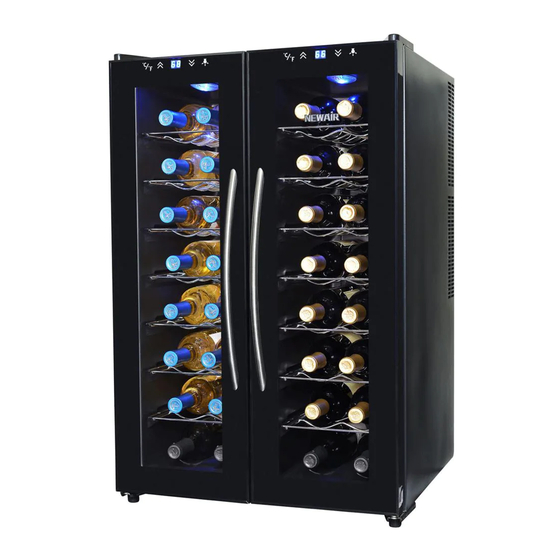
Summary of Contents for NewAir AW-320ED
- Page 1 INSTRUCTION MANUAL Thermoelectric Wine Cooler MODEL: AW-320ED Please read carefully and follow all safety rules and operating instructions.
-
Page 2: Product Diagram
Product Diagram 1. LIGHT 2. FAN MASK 3. SHELF 4. FOOT 5. HINGE 6.TEMPERATURE DISPLAY 7.TEMPERATURE CONTROLLER 8.DOOR FRAME 9.GLASS DOOR 10.HANDLE Important Safety Instruction To reduce the risk of fire, electrical shock, or injury when using your appliance, follows these basic precautions; Read all instructions before operating the wine cooler. -
Page 3: Installation Instruction
Installation Instruction Before using your wine refrigerator Remove the exterior and interior packaging. Check to make sure the following parts are included: 14 slide-out shelves 1 instruction manual Before connecting the unit to a power source, allow it stand upright for approximately 2 hours. This will reduce the possibility of any system malfunctions which may have occurred from handling during transportation. -
Page 4: Operating Your Wine Refrigerator
Operating Your Wine Refrigerator It is recommended that you installed the wine refrigerator in a place where the ambient temperature is between 10-26℃(50- 80°F) .If the ambient temperature is above or below recommended temperatures, the performance of the unit may be affected. For example, placing in extreme cold or hot conditions may cause interior temperature to fluctuate. -
Page 5: Troubleshooting
Troubleshooting To troubleshoot your wine cooler, follow the suggestions below to address the most common problems before seeking assistance from a service center: PROBLEM POSSIBLE CAUSES • The wine cooler will not operate. The unit may be plugged in using a different voltage. Also, the circuit breaker may be tripped or there is a blown fuse.

















Need help?
Do you have a question about the AW-320ED and is the answer not in the manual?
Questions and answers
It there a reset button on the PCB board the LED light went out
Based on the provided context, there is no mention of a reset button on the PCB board of the NewAir AW-320ED 32-Bottle Dual Zone Thermoelectric Wine Cooler. The documentation focuses on usage instructions (such as adjusting temperature and light using the display panel buttons), cleaning, maintenance, and moving the unit, but does not reference a reset button on the internal electronics or PCB.
Would you like help finding a service manual or technical diagram for the PCB?
This answer is automatically generated